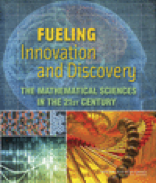Although in the eyes of an uninformed observer the mathematical sciences have an invisible presence in the everyday life, the recent developments in modern communications, transportation, science, engineering, technology, medicine, manufacturing, security and finance have all been enabled by advances in the mathematical sciences. Mathematics, statistics, operations research, and theoretical computer science have all been fundamental for the many of the recent advances in our modern society.
A distinguished panel of experts, gathered by the National Academies, has recently produced a very interesting and informative publication: Fueling Innovation and Discovery: The Mathematical Sciences in the 21st Century. This publication was released by the National Academies in advance of their report The Mathematical Sciences in 2025, developed with support from the National Science Foundation.
The publication succinctly presents a dozen examples, discussing the mathematics involved in the recent development of the human genome, medical imaging, medical diagnosis, information technology, animation as well as in the computational modeling of tsunamis, traffic, spread of pollutants etc. While by no means comprehensive, the selection of topics gives the reader an important view on various topics in the mathematical sciences that have significantly impacted the advances in new technologies and industries and our understanding of the world. At the same time the examples show the universality of mathematics, as the same concepts yield new insights in a multitude of disciplines and areas of human endeavor.
So why are the mathematical sciences still invisible in everyday life? Actually they are not; it is only the uninformed observer who needs to have the curiosity to understand what the sources of advancement are in our modern technological society, and publications like this can definitely help.
